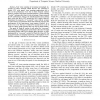Free Online Productivity Tools
i2Speak
i2Symbol
i2OCR
iTex2Img
iWeb2Print
iWeb2Shot
i2Type
iPdf2Split
iPdf2Merge
i2Bopomofo
i2Arabic
i2Style
i2Image
i2PDF
iLatex2Rtf
Sci2ools
IJSN
2007
2007
Hash-AV: fast virus signature scanning by cache-resident filters
Abstract— Fast virus scanning is becoming increasingly important in today’s Internet. While Moore’s law continues to double CPU cycle speed, virus scanning applications fail to ride on the performance wave due to their frequent random memory accesses. This paper proposes Hash-AV, a virus scanning “booster” technique that aims to take advantage of improvements in CPU performance. Using a set of hash functions and a bloom filter array that fits in CPU second-level (L2) caches, Hash-AV determines the majority of “no-match” cases without accesses to main memory. Experiments show that Hash-AV improves the performance of the open-source virus scanner Clam-AV by a factor of 2 to 10. The key to Hash-AV’s success lies in a set of “bad but cheap” hash functions that are used as initial hashes. The speed of Hash-AV makes it well suited for “on-access” virus scanning, providing greater protections to the user. Through intercepting system calls and wrapping glibc libraries...
CPU Cycle Speed | Hash Functions | IJSN 2007 | Virus |
| Added | 15 Dec 2010 |
| Updated | 15 Dec 2010 |
| Type | Journal |
| Year | 2007 |
| Where | IJSN |
| Authors | Ozgun Erdogan, Pei Cao |
Comments (0)

